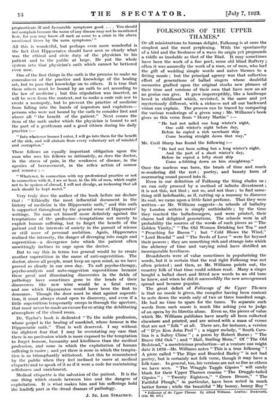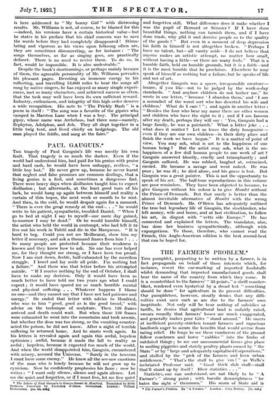FOLKSONGS OF THE UPPER - THAMES.*
OF all ministrations to human delight, Folksong is at once the simplest and the most perplexing. With the spontaneity of a bird and the freshness of a wave its origin yet propounds a riddle as insoluble as that of the Riad. It may sometimes have been the work of a fine poet, some old blind Raftery ; often it was assuredly the work of a man, or of men, who had the gift of wedding simple words and naive themes to a fitting music ; but the principal agency was that collective effort of generations of ballad singers whose doubtful memories grafted upon the original stocks new phrases of their time and versions of their own that have now an air no genius can give. It grew imperceptibly, like a landscape loved in childhood which, revisited, is the same and yet mysteriously different, with a richness not all our backward vision can explain. The process can be traced by comparing the various renderings of a given song : Mr. Williams's book gives us this verse from "Henry Martin" :—
"He had not sailed one long winter's night, One cold winter's night before day, Before he espied a rich merchant ship Come bearing straight down that way."
Mr. Cecil Sharp has found the following :— "He had not been sailing but a long winter's night, And the part of a short winter's day, Before he espied a lofty stout ship Come a-bibbing down on him straightway."
Once the nucleus was born, the brush of time and much re-rendering did the rest ; poetry, and beauty born of murmuring sound passed into it.
Even in our definition of Folksong the thing eludes us ; we can only proceed by a method of infinite divestment ; it is not this, not that ; not so, and not thus ; to find some- thing still indefinable, as if, cutting up a mummy to discover its soul, we came upon a little faint perfume. That they were written—as Mr. Williams suggests—in schools of balladry by London writers is simply unthinkable ; by the time they reached the balladmongers, and were printed, their charm had delighted generations. The schools were in all probability the sources of the words of such pieces as "The Golden Vanity," "The Old Woman Drinking her Tea" and "Preaching for Bacon " ; but "Cold Blows the Wind," "Lord Rends!" and "The Seeds of Love" were far beyond their powers ; they are something rich and strange into which the alchemy of time and varying mind have distilled an incomparable loveliness.
Broadsheets were of value sometimes in popularizing the words, but it is certain that the real right Folksong was not often printed ; and then, as Mr. Williams points out, the country folk of that time could seldom read. Many a singer bought a ballad sheet and fitted new words to an old tune he knew, and when he did it successfully the new arrangement spread and became popular.
The great defect of Folksongs of the Upper Thames is that no music is given, the compiler having been content to note down the words only of two or three hundred songs. He had no time to spare for the tunes. To separate such words from such music is much like asking you to judge of an opera by its libretto alone. Even so, the pieces of value , which Mr. Williams publishes have nearly all been collected elsewhere and printed, and are mixed with a mass of verses that are not " folk " at all. There are, for instance, a version of " D'ye Ken John Peel" ; a nigger melody, "South Caro- lina is a Sultry Clime " ; a poem by Robert Burns ; "The Brave Old Oak " ; and "Hail, Smiling Morn." Of "The Old Bedstead," a meretricious production—at a venture one might date it 1870—Mr. Williams notes "This is a true folksong " I A piece called "The Ripe and Bearded Barley" is not bad poetry, but is certainly not folk verse, though it may have a folk tune. In general, too, his versions are not so fine as others we have seen. "The Wraggle Taggle Gipsies" will surely blush for their Upper Thames cousins "The Draggle-tailed Gipsies" ; "Twenty Eighteen," " Green Broom," "The Faithful Plough," in particular, have been noted in much better forms ; while the beautiful "My. bonny, bonny Boy "
• Folksongs of the Upper Thames. By Alfred Williams. Loudon: Duckworth. 1124. 6d. net.]
is here addressed to "My bonny Girl" with distressing results. Mr. Williams is not, of course, to be blamed for this —indeed, his versions have a certain historical value—but he states in his preface that his chief concern was to save the words before they had completely disappeared ! Stimu- lating and vigorous as his views upon folksong often are, they are sometimes disconcerting, as for instance : "The songs themselves, as far as singing goes, are practically defunct. There is no need to revive them. To do so, in fact, would be impossible. It is also undesirable."
Despite the book's shortcomings, or perhaps mainly because of them, the agreeable personality of Mr. Williams pervades his pleasant pages. Devoting an immense energy to his collecting, and travelling 13,000 miles to hear the songs all sung by native singers, he has enjoyed so many simple experi- ences, met so many characters, and achieved success so often, that the task may well have been its own sufficient reward. Industry, enthusiasm, and integrity of this high order deserve a wide recognition. His note to "The Prickly Rush" is a poem in itself : "The song was a favorite of the gipsies who camped in Marston Lane when I was a boy. The principal gipsy, whose name was Archelaus, had three sons—namely, Zephyrus, Adolphus, and Job. They all slept together in a little twig tent, and lived chiefly on hedgehogs. The old man played the fiddle, and sang at the fairs."















































 Previous page
Previous page